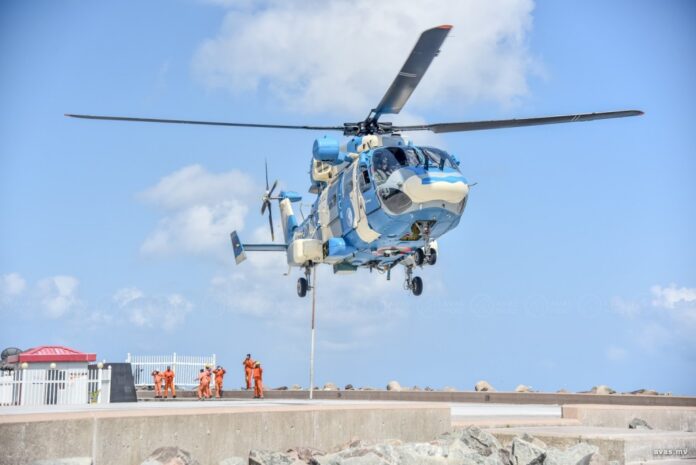The stand-off continues, with the bitterness exacerbated by the Sino-Maldivian decision to raise the level of their ties to a “strategic partnership”
By P.K.Balachandran
Colombo, January 15:
India and the Maldives issued contradictory statements on Sunday on the issue of the Indian helicopters stationed in the Maldives. The stand-off between the two countries continues with the bitterness exacerbated by the Sino-Maldivian decision to raise the level of their ties to a “strategic partnership.”
While the Indians contended that the choppers would stay and continue their humanitarian mission, the Maldivians said that the Indians had agreed to “fast track” the withdrawal of the helicopters.
The Maldives media quoted the Ministry of Foreign Affairs as saying that at the High Level Meeting held in Male on Sunday, “both sides expressed willingness to intensify cooperation and agreed to fast-track the withdrawal of Indian military personnel.”
Abdulla Nazim Ibrahim, the Principal Secretary to the Maldivian President on Public Policy, told a press conference that President Mohamed Muizzu had proposed the withdrawal of Indian troops within the next 30 days. The deadline was given as March 15.
“The government, and specifically the President’s Office proposed this date to the agenda of the meeting,” Ibrahim stated.
But the Indian External Affairs Ministry said in a statement that during the core group meeting “both sides discussed a wide range of issues related to bilateral cooperation, including steps to enhance the partnership and expedite the implementation of ongoing development cooperation projects.”
“Both sides also held discussions on finding a mutually workable solution to enable the continued operation of Indian aviation platforms that provide humanitarian and medevac services to the people of Maldives.”
It was agreed to hold the next meeting of the High Level Core Group in India on a mutually convenient date.
India Clearly Irked by China Visit
Clearly, India is irked by President Muizzu’s visit to China where his government signed several MoUs which expand and enhance China’s footprint in the Maldives greatly and diminish the Indian footprint.
Of particular concern to New Delhi would be raising relations between the Maldives and China to the level of a strategic partnership. Joint exploitation of the Blue Economy is also to be undertaken. The latter may have implications for India’s security.
As a follow up of the pro-China tilt, President Muizzu issued a firm rebuke to India asserting that the Maldives’s small size does not give any nation the right to bully it.
This statement was made at a press briefing at the Velana International Airport following his return from a state visit to China, where he sought alternatives to the Maldives’ longstanding reliance on India.
The media reported that from March 1, the Maldivian national carrier’s air ambulance will replace Indian aircraft in emergency operations.
President also announced agreements with China for sustainable food security and with Turkiye for food staples importation.
Additionally, the government plans to commence importing pharmaceuticals directly from Europe and the United States, aiming to reduce dependence on Indian imports.
During President Muizzu’s visit to China, President Xi Jinping reaffirmed China’s support for the Maldives in safeguarding national sovereignty and dignity. A joint communique highlighted mutual support in upholding core interests, with China opposing external interference in the Maldives’ internal affairs.
The bilateral discussions between Maldives and China centred on four principles: mutual respect, sovereign equality, territorial integrity, and non-interference in internal matters.
President Muizzu stressed the importance of these principles in the context of the Maldives-China relations and indirectly critiqued India for its alleged interference in the Maldives’ domestic politics during previous administrations.
Row Over Lakshadweep
The diplomatic row with India escalated recently, particularly after Indian Prime Minister Narendra Modi’s video promoting tourism in Lakshadweep, mistakenly seen in the Maldives as a direct Indian challenge to the Maldives’ tourism industry.
This was followed by social media posts from three Maldivian Junior Ministers insulting Indian Prime Minister Narendra Modi. Subsequently the erring Junior Minsters were suspended. Social media in India demanded the boycott of the Maldives as a tourist destination. India is the single largest contributor to tourist arrivals in the Maldives.
President Muizzu’s administration, which came to power in November after a victory over Ibrahim Mohamed Solih, has taken notable steps in redefining its foreign policy from his predecessor’s “India-first” to a “pro-Maldives” policy.
Muizzu is in the process of reviewing about a hundred bilateral agreements with India entered into by the previous pro-Indian government.
Hopes of Rapproachement
Hopes about a rapprochement with the Maldives were raised when India’s Foreign Minister S.Jaishankar told an audience in Nagpur on January 13 that India would work with neighbouring countries even if they changed policies.
Jaishankar said that a cornerstone of India’s diplomatic efforts over the past decade had been building a strong connection with neighbouring countries, “regardless of political fluctuations.”
Though Jaishankar did not name the Maldives, he acknowledged the recent rift, attributing it to the inherent unpredictability of politics.
“Politics is politics. I cannot guarantee that in every country, every day, everybody will support us or agree with us,” he said.
Despite these challenges, Jaishankar emphasised the success of the ‘Neighbourhood First’ policy over the past decade.
While acknowledging that sometimes things do not go as planned, Jaishankar stressed the importance of reasoning with people and bringing things back where they should be.
This approach, he suggested, is a crucial aspect of his role in managing India’s foreign relations.
Jaishankar’s statement underscored India’s diplomatic strategy of fostering solid ties with its neighbours, even in the face of political disagreements.





